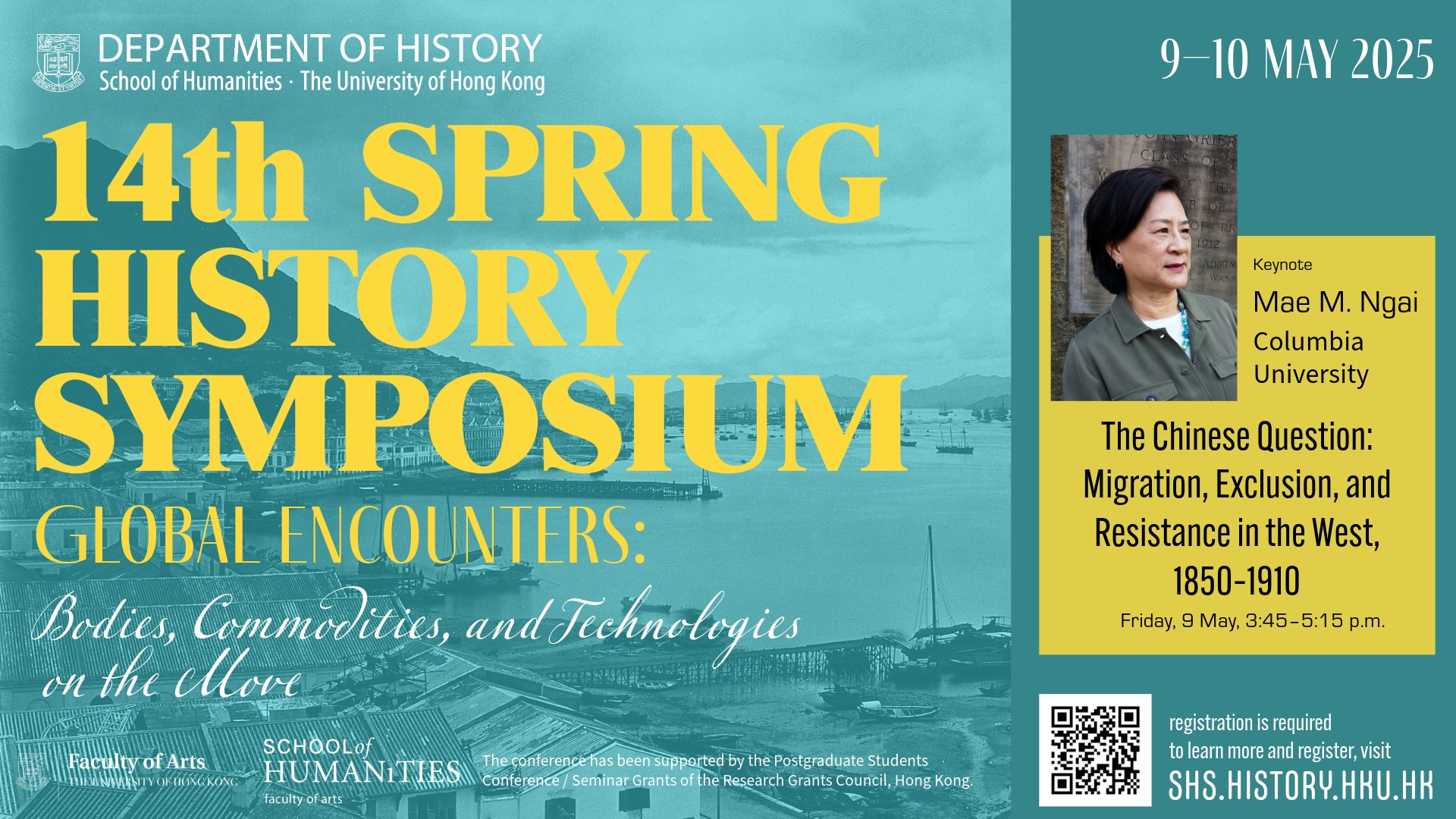
- This event has passed.
14th Spring History Symposium – Global Encounters: Bodies, Commodities, and Technologies on the Move
May 9, 2025 - May 10, 2025

The modern world has been and is increasingly shaped by cross-border movements. People of various occupations and diverse gender, race, and national identities, in crossing paths beyond borders, have sparked some of the most significant creations and conflicts in history. The web of global movement, however, extends beyond people alone. Business exchanges and the quest for scientific knowledge have mobilized and redirected human efforts with remarkable momentum, forming extensive networks often unnoticed by people within them. Commodity circulation and the dissemination of science and technologies thus provide new vantage points from which to examine previously ignored historical links and to rethink the meanings of global encounters.
This year, the Symposium will host postgraduates and early career scholars from across Asia, Europe, and North America, who will present research highlighting global encounters and movements, examining both human stories and narratives in which commodities and technologies take center stage.Please direct any enquiries to Ms. Iris Boyun Lei at hkuhistorysymposium@gmail.com.

Keynote Lecture: The Chinese Question: Migration, Exclusion, and Resistance in the West, 1850-1910
Keynote Speaker: Mae M. Ngai, Columbia University
Discussant: Loretta Kim, University of Hong Kong
Taking a global and comparative approach, my work situates Chinese emigration to the anglophone West (the U.S. and the British settler colonies) during the 19 century in the context of broader dynamics of global trade and finance and the rise of Great Britain and then the United States as the premier global economic hegemons—as creditors and as colonizers, as nation builders and as empire builders. Because China was never formally colonized, the Western powers used measures like unequal treaties after the Opium Wars (1839-1860) and the exclusion laws (1875-1910) as instruments of colonialism and containment. The exclusion laws aimed to contain China, to limit the mobility of its people to the West. The idea that Chinese people should be excluded from immigration and citizenship was a radical idea in the late nineteenth century because it contravened prevailing norms of free trade and free migration. Chinese exclusion, born of a powerful alchemy of race and money, was part of a new way of imagining, organizing, and governing the world.The exclusion laws also shaped the development of Chinese diasporic communities in the West—their social life, political economies, their relationship to Qing officials, and their participation in anti-Qing politics and the emergence of modern Chinese national identity.
Mae M. Ngai is Lung Family Professor of Asian American Studies and Professor of History at Columbia University. She is a U.S. legal and political historian interested in the histories of immigration, citizenship, nationalism, and the Chinese diaspora. She is author of the award winning Impossible Subjects: Illegal Aliens and the Making of Modern America (2004); The Lucky Ones: One Family and the Extraordinary Invention of Chinese America (2010); and The Chinese Question: The Gold Rushes and Global Politics (2021); and coeditor of Corky Lee’s Asian America: Fifty Year of Photographic Justice (2024). Ngai has written on immigration history and policy for the Washington Post, New York Times, Los Angeles Times, the Atlantic, the Nation, and Dissent. Before becoming a historian she was a labor-union organizer and educator in New York City, working for District 65-UAW and the Consortium for Worker Education. She is now writing Nation of Immigrants: A Short History of an Idea (under contract with Princeton University Press).
A native of the United States, Loretta Kim 金由美 is a graduate of Harvard University (BA, MA, PhD) and was formerly an assistant professor at the State University of New York (Albany) and Hong Kong Baptist University before joining SMLC. She is a historian of late imperial and modern China and has taught courses on modern Asia, colonialism and imperialism in Southeast Asia, and Sino-Russian relations. Her primary research areas include the history of Inner Asia from 1600 to the present, comparative history of borderlands and frontiers, and Chinese ethnic minority languages and literature, particularly Manchu and Mongolian.Dr. Kim’s first single-authored monograph is about the Orochen people in northern Heilongjiang during the Qing dynasty (1644-1911). Her second major work is a co-authored monograph about the Russian Orthodox Church in Hong Kong. She completed a GRF-funded project about non-Han names in Northeast China from 1600 to 1900 [https://www.lekresearchcollective.net/] and is working on a third monograph about food resources and culinary practices in the Amur River region and co-editing two volumes about the history of Northeast Asia.
